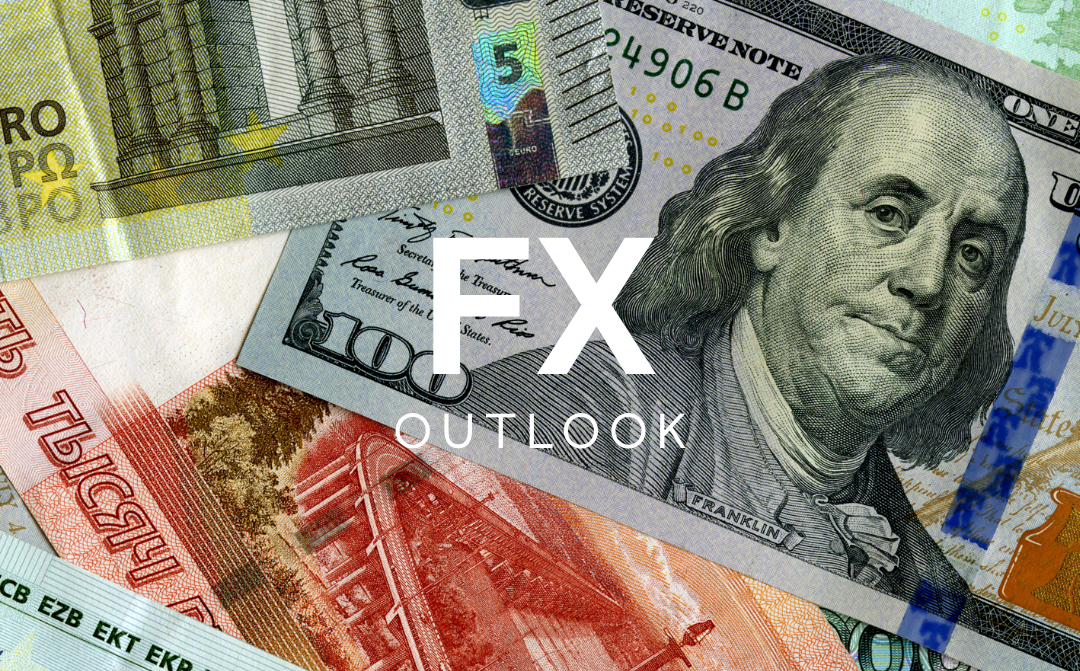25 Sept FX outlook – USD, EUR, GBP, CAD, AUD, NZD

Table of Content
USD
The US dollar has made it 10 weeks in a row with then greenback back in the driving seat thanks to a wider risk-off sentiment and a relatively hawkish Federal Reserve meeting just gone. In an eventful week filled with central bank activities, the US dollar managed to come out top against many of the majors, with the Fed played along with investor’s expectations.
It’s no news that the Federal Reserve indicated that it would rely on economic data for its interest rate decisions. The Federal Reserve kept its interest rates steady at 5.50% as expected, but their dot plot projections signalled an expectation of a 5.1% for 2024 compared with the previous projection of 4.9%. Ultimately, the rise in crude oil does raise risks that central banks may have to take on a more hawkish tone in the event of a second inflation surge. Such a move would benefit havens such as the dollar, meaning that we will likely see USD correlate closely with energy prices going forward. In terms of the US economy, the resilient nature of data compared with their European counterparts do encourage USD strength as the Fed look to push rates higher towards the end of the year. The mixed PMI released last week signalled did see manufacturing move higher, while services remained in expansion despite a decline back towards the 50 threshold.
Moving on into the new week with the “higher for longer” narrative already settled into the market, attention is shifted to a new set of economic reports that could impact the US dollar’s strength. The CB consumer confidence report will give us an insight into consumer spending, with inflation forecasts impacted as a result. In addition, the US durable goods, US final GDP, unemployment claims, and Powell testimony will be monitored by investors as the US dollar looks to record another profitable week.
EUR
Although it performed poorly against the US dollar due to a hawkish Fed, the Euro managed to remain stable against other currencies as it took advantage of inactive central bank interest rate decisions amidst another week of disappointing data reports. The strength of European currencies throughout much of this year has come into question thanks to a more dovish shift at the ECB and BoE.
The single currency has been on the decline as the eurozone economy remains unattractive to investors, with the dollar strength seeing particular weakness for EURUSD. Recently, the interest rate hike by the ECB failed to boost the EUR as the dovish remarks from the ECB President weighed on sentiment. With that in mind, analysts expect the region to slip into a recession as it continues to see falling numbers from a data point of view with the latest PMI reading across the bloc showing a contraction in business activity.
With a bearish outlook on the Euro, positive readings from the economic calendar could offer some relief in the new week as it looks to build up from the previous week’s performance. Investors will be focusing on inflation in particular, with Thursday’s German and Spanish CPI reports acting as a precursor to Friday’s eurozone release. With energy prices on the rise, markets will be highly sensitive to any signs that we are going to see inflation push upwards in a more dramatic fashion than had been expected. With that in mind, watch out for the month-on-month readings as means to strip out the base effects that dominate the annual reading. Last month’s monthly CPI figure of 0.5% annualizes to a worrying 6%, with any rise in that monthly figure signalling a risk of further upside for the current year-on-year figure of 5.2%.
GBP
The pound has been hit hard as markets reacted to a busy week that saw volatility spike in the wake of a surprisingly dovish interest rate decision from the Bank of England. Sterling has long enjoyed a preferential treatment as the relatively high rate of inflation led many to believe that the BoE will go higher and stay for longer than their peers.
Last week flipped the script, with the surprise rate hold coming as the MPC signalled the likely end to their tightening phase. This followed a surprise decline for UK CPI on Wednesday, with core inflation also helping the BoE cause in moving sharply lower (6.2% from 6.9%). While the MPC were remarkably divided (5-4 split on vote), the next ‘live’ meeting in November will see hawk Jon Cunliffe replaced by unknown quantity Sarah Breeden. Meanwhile, Friday’s sharp decline in the services PMI figure served to highlight the threat of a sharp contraction, as the lagging effect of the BoE rate hikes impact the economy. For now the UK appears to have dropped in line with their peers, with the long GBP trade unravelling in the process.
Looking ahead, a relatively quiet week for UK data only really kicks into gear on Friday. Expectations of an improved final revision to the Q2 GDP figure are unlikely to spark calls for further BoE tightening given the lagging nature of the metric. Aside from that GDP release, Friday sees the housing market in focus as mortgage approvals, mortgage lending and house price (Nationwide) data due. With higher rates gradually feeding through as fixed mortgages roll over, affordability concerns could continue to put pressure on prices and activity.
CAD
The Canadian dollar became the second best-performing currency behind the New Zealand dollar as the latest inflation report from Canada suggests the Bank of Canada (BoC) could go again on rate hikes. The inflation report which came out beyond expectations was driven by high gasoline prices. The Bank of Canada has made it known that it is committed to its monetary policy program as it aims to bring inflation down to its 2% target. For the BoC, the rising energy prices serve to both boost growth prospects, but lift inflation expectations. The CAD relationship with crude prices have helped drive strength for the currency, with calls of a push towards $100 a barrel lifting CAD sentiment.
The new week has kicked off with the CAD on the front-foot once again, despite a somewhat changeable start for WTI. Rising inflation has helped drive expectations of a BoC rate hike higher, which in turn helps support the Canadian dollar. Any further support for additional tightening would similarly help the CAD. There will be a significant focus on the monthly GDP report on the data front, with signs of strength seen through the prism of supporting further tightening. However, with last month seeing growth fall into negative territory, another subsequent contraction could quell calls for additional tightening to the detriment of the Canadian dollar.
AUD
The Australian dollar has been on the front foot over recent weeks, with a relatively choppy week ultimately looking to continue that trend thanks to weakening currencies in Europe. While China fears simmer in the background, we have seen some optimism grow around a potential stabilisation in the region.
Last week saw RBA minutes that point towards a data dependant approach from a central bank that appears to have ended their tightening phase. This is a line all central banks must tout given the uncertain nature of inflation amid rising energy prices. With now ex-Governor Philip Lowe leaving after seven years at the helm, there will be a focus on his successor’s approach going forward. Friday’s PMI report provided a mixed scorecard for the Australian economy, with weakness in the manufacturing sector overshadowed by an impressive rebound for services that drove the composite reading back into expansion territory (50.2).
Looking ahead, the new RBA Governor Michele Bullock comes into focus as the bank hosts the 2023 inflation conference on Tuesday. That inflation theme continues into Wednesday, with the monthly CPI indicator expected to turn upwards. Also keep an eye on retail sales data due out on Thursday.
NZD
The New Zealand dollar enjoyed a strong week, the with the NZD pushing upwards in a continuation of its recent recovery phase. With the New Zealand economy in relatively rude health and the Chinese story starting to improve, the currency appears to be enjoying somewhat of a renaissance against many of its peers.
Last week saw two main causes for optimism around the New Zealand economy, with both dairy prices and GDP on the rise. Tuesday’s global dairy trade figure is often overlooked by many, but the strong 4.6% reading made for good reading amongst agricultural exporters. Meanwhile, the impressive 0.9% rise in Q2 quarterly GDP allays fears of a China-led contraction.
Looking ahead, a relatively quiet week sees the ANZ business confidence survey released on Thursday, with positive expectations signalling a potential uptick. However, Friday’s consumer confidence survey could signal a negative shift if forecasts of a decline come to fruition.
Disclaimer: This material is a marketing communication and shall not in any case be construed as an investment advice, investment recommendation or presentation of an investment strategy. The marketing communication is prepared without taking into consideration the individual investors personal circumstances, investment experience or current financial situation. Any information contained therein in regardsto past performance or future forecasts does not constitute a reliable indicator of future performance, as circumstances may change over time. Scope Markets shall not accept any responsibility for any losses of investors due to the use and the content of the abovementioned information. Please note that forex trading and trading in other leveraged products involves a significant level of risk and is not suitable for all investors.







